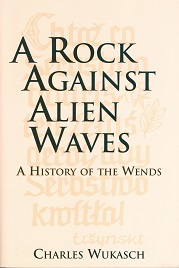Copies of A Rock Against Alien Waves can be purchased at the Texas Wendish Heritage Society Museum, 1011 CR 212, Giddings, TX 78942 through its Executive Director, wendish@bluebon.net. This preface was written by Dr David Zersen.
 Preface
Preface
In teaching students about heritage, I have often made the comment that there is no such thing as a generic American. Everyone in this country – for that matter, everyone on this continent – came here from somewhere else. If the people of the Americas have any sense of curiosity at all, they will want to know something about these origins. Here in Texas, there are still to be found representatives of those first peoples whose arrival reaches back thousands of years. Large numbers of Mexican families here can also trace their roots back to a time when this territory belonged to Mexico. Countless explorers, pioneers and settlers came from Europe and Africa; in more recent years, many thousands came from India and Southeast Asia. The schools and cities of this State now comprise a rich diversity formed from these immigrants. To say that all are now Americans is to prize the unity sought for this people. To ignore the cultural, ethnic and linguistic heritage which underlies their place in this nation, however, is to court ignorance as well as psychological confusion. The differences which shape personal perspectives and world views here range on a spectrum from insignificant to profound. Studies which explore these differences make important contributions to the nation’s common life. This study of the Wends is such a contribution.
The Wends who arrived in Galveston in 1854 were unique in a number of ways. They came largely for economic reasons, although they had both religious and cultural views they hoped to encourage and preserve. As a Slavic minority group in the German country they left, they chose Texas because of the opportunity it offered. They came not by tens and twenties, but almost six hundred strong, as a veritable colony, seeking to kindle smoldering embers of ethnic consciousness into a radiant flame in the new world. The fact that Texas functioned somewhat trilingually (English, Spanish and German) in the 1850s made their hopes relatively naïve and, ultimately, led to their assimilation into the dominant German culture in Central Texas. However, this should not detract from the significant contributions that they made to the developing Texas economy, not to mention the moral and cultural heritage of Central Texas. The legacy lives on both in the traditions of many smaller communities as well as in the names of thousands of Texans whose Slavic spellings belie their Wendish origins.
A number of books in English have told the story of this Wendish experiment on Texas soil and two of the best by George Nielsen are still in print. However, there is no comprehensive and current work in English which provides the European history of the Wends, thus setting the stage for their presence in America. The one European work of significance by British Slavist, Gerald Stone, The Smallest Slavonic Nation, is out of print. For this reason, Charles Wukasch’s admirable review of the noble history of these little-known people is a significant contribution to scholarship as well as to the curious student or citizen who wants to know more about personal heritage or the valuable contributions to the United States of America from a proud and ancient people.
Concordia University Press is pleased to make this contribution available not only because of its value for personal and scholarly research, but because Concordia University at Austin is the only university in the world founded primarily by people of Wendish descent. In 1926, almost 75 years after the arrival of the Wends, thirteen Lutheran congregations in Texas which themselves had been founded by people largely of Wendish ancestry, established Concordia in the capital city. Today the University is proud to say to students and a much larger constituency of friends and donors that generic Americans did not found this institution, but rather a unique group of immigrants who took enormous risks to come here (almost eighty of their number died en route) and left legacies which continue to influence our contemporary world.
David Zersen, President Emeritus
Concordia University at Austin
Austin, Texas
(In the Sesquicentennial of the Wendish Immigration, 1854-2004)
]]>